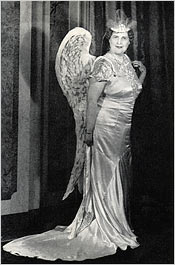
For those who just don’t get it, opera will always be silly and unfathomable, the singers mad, its unrestrained diva worship craziest of all. What, one wonders, do these unbelievers make of Florence Foster Jenkins? More than 60 years after her death, Lady Florence remains an imperishable legend among those who rejoice in the improbable aspects of the art. Whatever she may have lacked—say, a voice—Florence Foster Jenkins had what the Italians call il sacro fuoco, “the sacred fire,” more than enough to animate the sweet portrait Stephen Temperley draws of her in his new play, Souvenir.
Jenkins’s fierce self-confidence can be heard in every note of the recordings she made shortly before she died at 76, weeks after giving a sold-out vanity concert in Carnegie Hall. Some of the audience came to laugh at the charmingly deranged wealthy lady, oblivious to her vocal inadequacies. One aria reminded a critic of “a cuckoo in its cups.” But audiences appreciated her joy, as well as a quality she was blissfully unaware of: that poignant nobility often projected by harmless figures who take impossible chances and hilariously fail.
As befits a legend, there are conflicting views of Jenkins. In the liner notes of a delicious recent CD titled The Muse Surmounted, Gregor Benko recoils before “a monster of vanity and selfishness, but not crazy … cheap, secretive, superstitious, mean, dowdy and a snob.” This may well have been the real Florence Foster Jenkins, but she is only distantly related to the myth, and to the lovably daffy dowager of Souvenir. What really interests Temperley is the relationship between Jenkins and her long-suffering accompanist, Cosme McMoon, whereby two deeply untalented people, one totally possessed by her mission and the other all too aware of his mediocrity, find a crazy, touching mutual comfort. And Judy Kaye, after giving an astonishingly accurate impersonation of Jenkins’s unique voice, finally captures the diva’s ultimate divine madness, bringing down the curtain with a pure-toned, beautiful “Ave Maria” that Florence Foster Jenkins heard only in her dreams.